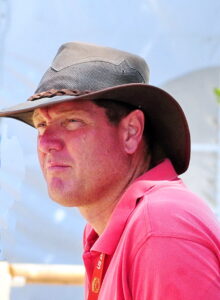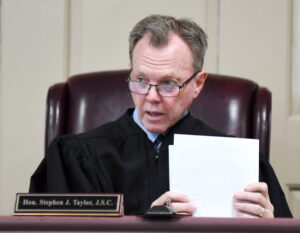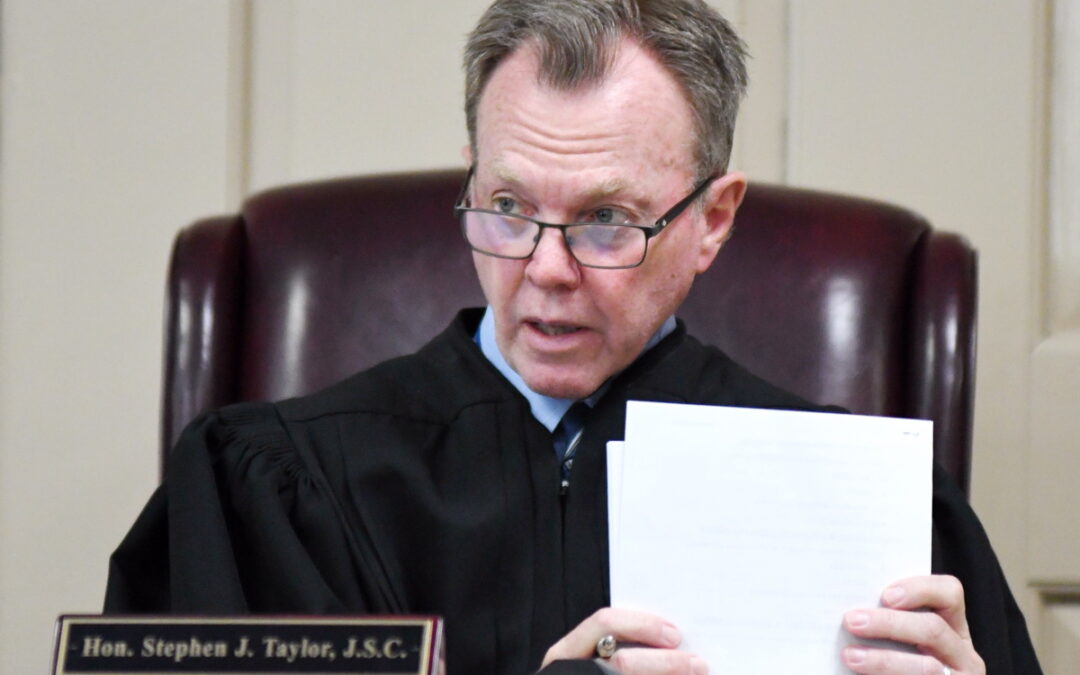Self-defense cannot be asserted in the Michael Barisone attempted murder trial, Superior Court Judge Stephen Taylor ruled today.
The judge made that decision as he met this morning with defense and prosecution lawyers at the Morris County Courthouse in Morristown, N.J., to discuss the charge to the jury that will be given on Monday, when the panel goes into deliberations following summations from the attorneys. The charge involves instructions to jurors about the applicable law and what they may or may not consider as they deliberate the fate of the dressage trainer.

Michael Barisone spectating at the 2008 U.S. national dressage championships in California. (Photo © 2022 by Nancy Jaffer)
Barisone is charged with shooting his student, Lauren Kanarek, twice in the chest and with possession of a gun for unlawful purposes. Psychologists testified that Barisone, who did not appear on the witness stand during the nine days of testimony in the trial, told them he does not remember the incident.
Barisone had been at odds with Kanarek and her boyfriend, Robert Goodwin, and was moving to get them evicted from his Hawthorne Hill farm in the Long Valley section of Washington Township,N.J.
His attorney, Edward Bilinkas, had put forward a strategy that combined insanity and self-defense. But Taylor didn’t think there was sufficient evidence in the record for self-defense.
Bilinkas had mentioned several times that Barisone received a beating, which he contends could have happened before the shooting, but wasn’t allowed to ask Kanarek about that when she was on the witness stand.
The judge asked what the evidence was that the beating occurred prior to the shooting and that Barisone utilized a gun during or afterwards to protect himself. Bilinkas said the only evidence of the timeline of the shooting comes from Kanarek and Goodwin.
He noted that previous threats from Kanarek and Goodwin, as well as Goodwin making a gesture with his finger like a gun the day before the shooting, underlined intimidating statements the victim made regarding Barisone on social media.
The judge stated that even if the jury doesn’t believe everything Kanarek or Goodwin said about the incident, the panel “would be engaging in this court’s view in sheer speculation to determine the beating happened before the gun was withdrawn and that Mr. Barisone withdrew the gun as a result of the beating and used it in self-defense.”

Judge Stephen Taylor delivered his thoughts to attorneys on Friday in Morristown. (Photo © 2022 by Nancy Jaffer)
He added, “Without the testimony of Mr. Barisone about the incident, there’s simply no evidence in the record and it’s not sufficient for the jury to make that (self-defense) determination simply from the cross-examination by Mr. Bilinkas.”
In other discussions, the judge said he will tell jurors the way they should consider several key comments attributed to Barisone after the incident and quoted by police officers and an emergency medical technician.
The statements, mentioned several times in the trial, were “Is this real? I have to wake up” and a paraphrase of “They destroyed my life over the last six months. I had a good life, they took it all away” and that he was sorry. If they determine the statements weren’t made, they must be disregarded; if they find the statements credible, they need to give them the appropriate weight, the judge said.
A verdict of insanity would cover all four counts against Barisone, including possession of a weapon for unlawful purposes. Morris County Supervising Assistant Prosecutor Christopher Schellhorn said if the jury simply found Barisone not guilty, it would then consider a lesser included offense of attempted aggravated assault.
Bilinkas said he didn’t think a lesser included offense is appropriate.
But in the judge’s view, even if the jury does not believe Barisone was legally insane at the time of the commission of the offense, that does not mean they can’t consider his mental state in determining whether he acted purposefully or knowingly in committing the crime.
If the jury finds the threshold for legal insanity is not met, it could decide Barisone did have diminished capacity because of the stressors, as well as the circumstances of his depressive state, according to the judge.
Diminished capacity “may prevent him from purposely or knowingly or having a conscious object to commit the murder of Lauren Kanarek and Robert Goodwin (who was not wounded), such that they would consider a lesser charge of recklessly trying to cause serious bodily injury,” commented the judge.
Bilinkas said he didn’t think a lesser included offense is appropriate and doesn’t want the jury to consider it.
“The only thing I’m asking for is the attempted murder charge,” he said.
The judge noted the jury could reject insanity, but still find that the defendant, because of mental health issues, could not form the conscious object to kill someone. That would be the diminished capacity.
“It would reduce the crime. It’s not justification, it doesn’t remove all legal responsibility like insanity does, but it reduces the charge from a higher level, which has a specific state of mind…the intent to kill,” said Taylor. . “Diminished capacity reduces the crime to a lesser crime.”




